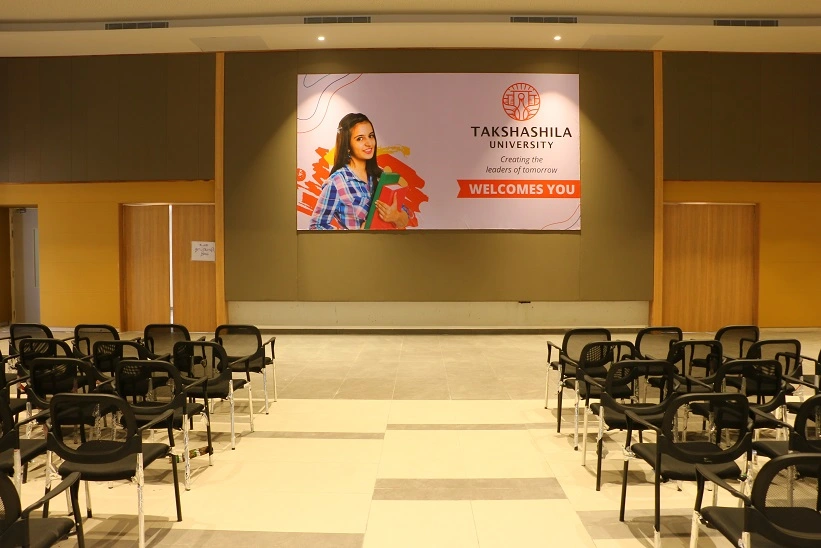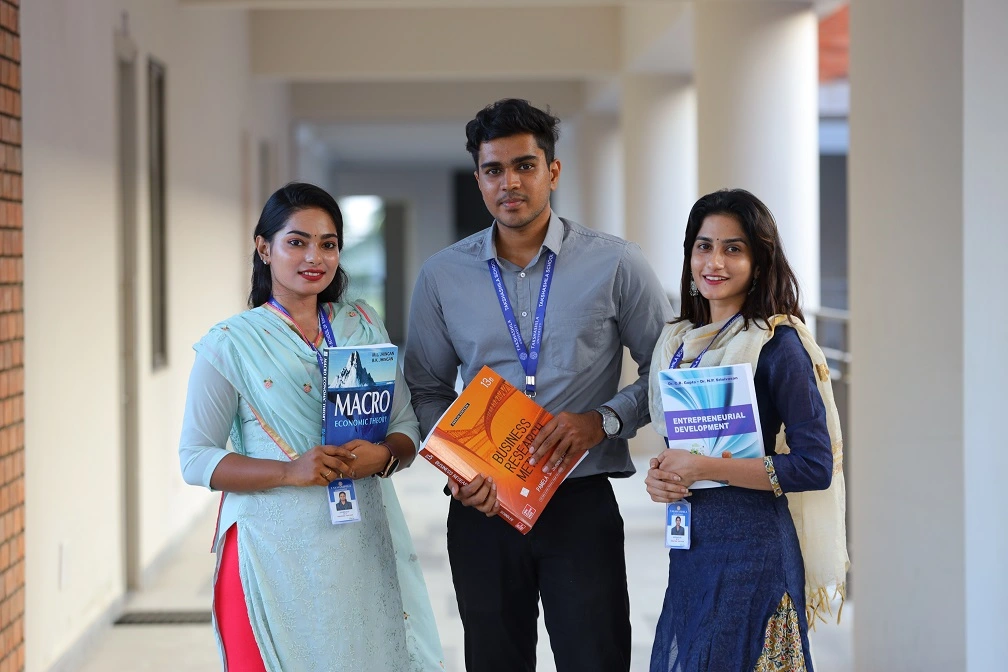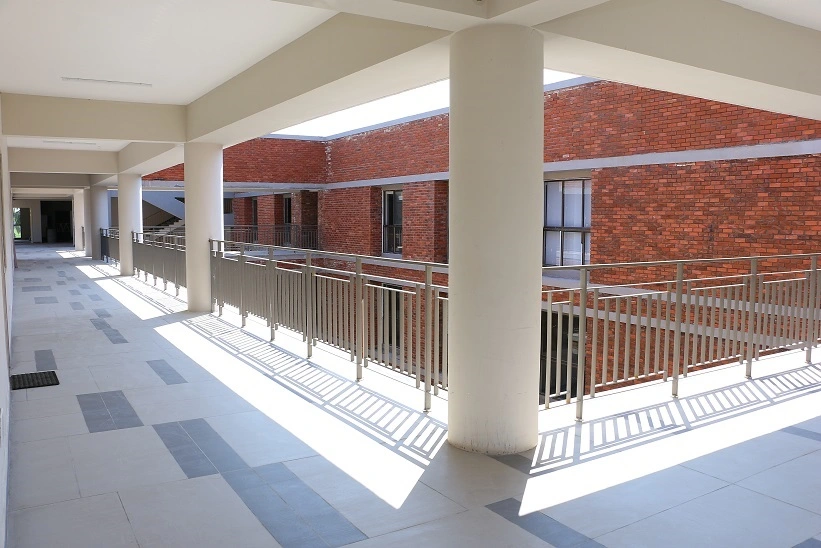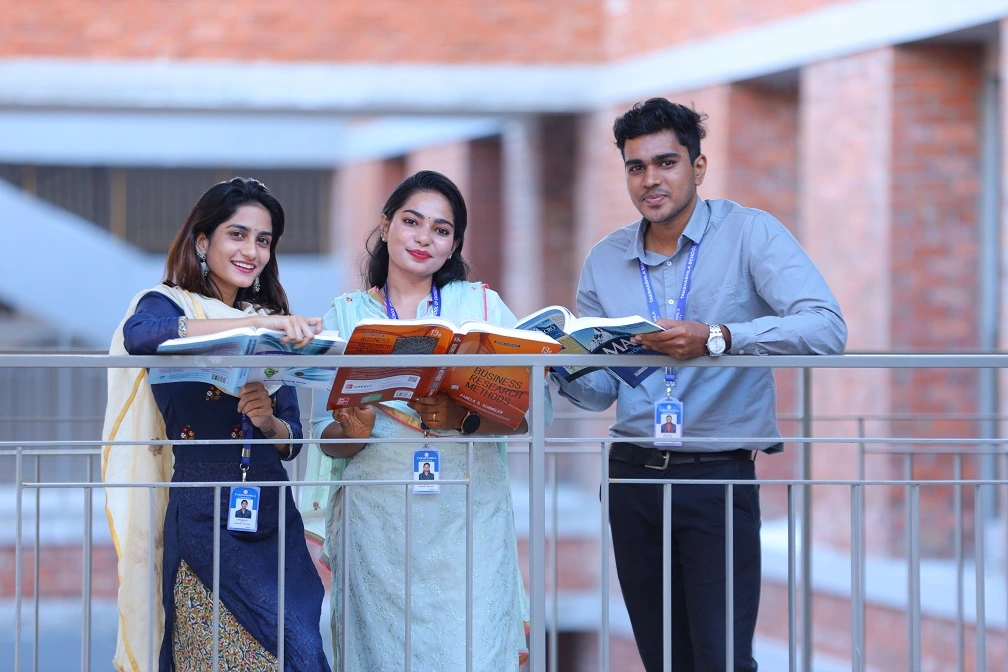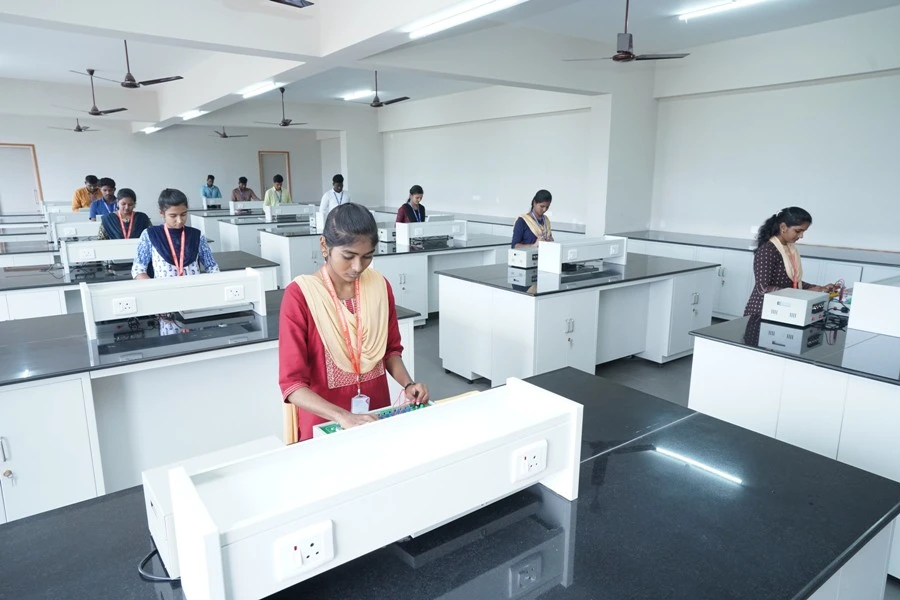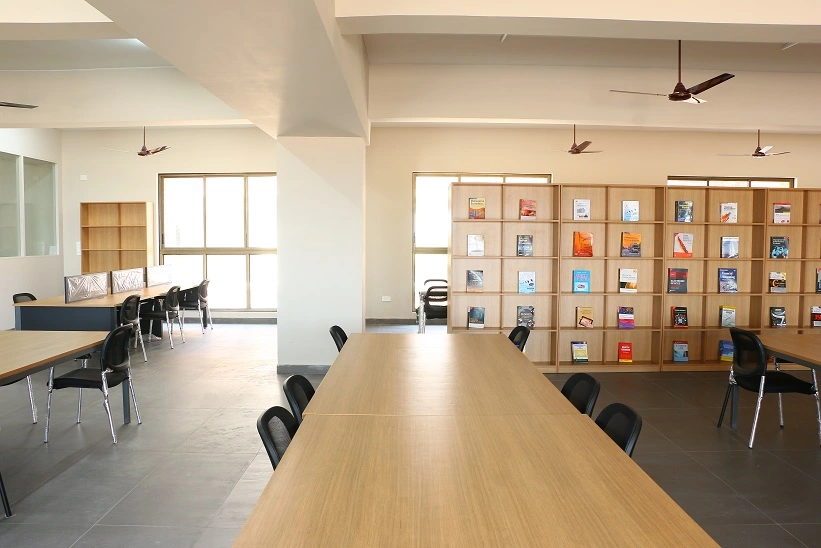Ph.D. Economics
- Hands-on Training
- Faculty with International Experience
- Advanced Curriculum
- Upto 100% Scholarship based on merit
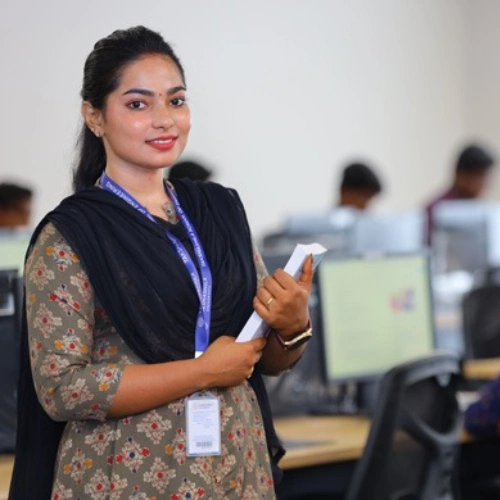
About the Course
The Ph.D. in Economics at Takshashila University is structured to develop advanced research capabilities and a deep understanding of economic theories and practices. This rigorous programme covers key areas such as econometrics, game theory, monetary economics, international trade, and economic development. It is designed to nurture analytical thinking, empirical research skills, and critical evaluation of complex economic issues.
Through a combination of coursework, seminars, and independent research, you will gain the expertise required to contribute to academic research, public policy, and industry-driven economic analysis. The programme prepares you for a career in academia, government, think tanks, and international organisations.
Course Curriculum

Year 1
The first year focuses on developing a strong theoretical foundation and research orientation in economics. You will study advanced microeconomics, macroeconomics, and quantitative methods, while also being introduced to research methodology and academic writing.
Key Subjects: Advanced Microeconomic Theory, Advanced Macroeconomic Theory, Econometrics, Research Methodology, Mathematical Economics.
Year 2
In the second year, the emphasis shifts towards specialised topics and research. You will begin formulating your research proposal and delve into areas aligned with your chosen research domain. Seminars and paper presentations will help refine your analytical skills.
Key Subjects: Game Theory, Monetary Economics, International Trade, Development Economics, Seminar Presentation, Research Proposal Development.
Year 3
This phase is dedicated to dissertation work and independent research under faculty supervision. You will conduct original research, contribute to academic journals, and defend your thesis before a doctoral committee.
Key Focus Areas: Dissertation Research, Thesis Writing, Journal Publication, Final Viva Voce.
Programme Outcomes (POEs)
Upon completing the Ph.D. in Economics at Takshashila University, you will have developed the following advanced academic and research capabilities:
Advanced Economic Knowledge
You will possess in-depth expertise in microeconomics, macroeconomics, econometrics, and applied economic theory, enabling you to analyse and interpret complex economic issues across various sectors.
Independent Research Competence
You will demonstrate the ability to design, conduct, and present original, high-quality research that contributes to the advancement of economic knowledge, supported by critical thinking and data analysis skills.
Policy and Decision-Making Insight
You will be equipped to offer evidence-based recommendations for economic policy-making, drawing from empirical research and theoretical insights, relevant to both national and international economic contexts.
Quantitative and Analytical Proficiency
You will acquire strong skills in quantitative methods and statistical software, allowing you to handle large datasets and generate meaningful conclusions from economic models.
Academic and Professional Communication
You will be able to effectively communicate complex economic ideas through academic writing, presentations, and publications, suitable for journals, conferences, and policy briefs.
Ethics and Social Responsibility
You will understand and apply ethical standards in research and economic practice, with an awareness of how economic policies impact societies, particularly marginalised communities.
Programme Outcomes (POs)
The Ph.D. in Economics at Takshashila University will help you achieve the following broader learning outcomes:
PO1: Advanced Theoretical and Applied Knowledge
You will develop a deep understanding of core and advanced concepts in economics, including econometrics, game theory, and monetary economics, allowing you to critically examine economic systems and contribute original insights to the discipline.
PO2: Independent Research Capability
You will gain the ability to design and conduct independent, high-quality research that addresses complex economic questions using appropriate qualitative and quantitative methods.
PO3: Policy Analysis and Problem-Solving Skills
You will refine your capacity to evaluate public policies and economic strategies, providing data-driven solutions to real-world problems in areas such as development, finance, trade, and governance.
PO4: Academic and Scholarly Communication
You will acquire the skills to communicate research findings effectively through academic writing, peer-reviewed publications, and presentations at national and international forums.
PO5: Ethical Research and Social Responsibility
You will apply ethical standards in research and demonstrate a commitment to addressing socio-economic inequalities and promoting inclusive growth through evidence-based economic insights.
PO6: Interdisciplinary and Global Perspective
You will be equipped to integrate knowledge from other disciplines, such as political science, sociology, and environmental studies to approach economic issues from a broader, globally relevant perspective.
Programme Specific Outcomes (PSOs)
The Programme Specific Outcomes focus on the specialised academic and research skills you will gain through the Ph.D. in Economics, enabling you to contribute significantly to the field of economic analysis, policy, and academia.
PSO1: Expertise in Economic Modelling and Econometrics
You will develop advanced skills in building and interpreting economic models and applying econometric techniques, enabling you to analyse complex data sets and draw meaningful conclusions for academic, government, or industry use.
PSO2: Specialisation in Policy Research and Development Economics
You will gain specialised knowledge in evaluating economic development strategies and public policy frameworks, allowing you to contribute effectively to national and global economic planning and policy-making.
PSO3: Proficiency in Theoretical and Applied Microeconomics and Macroeconomics
You will acquire deep insights into microeconomic behaviour and macroeconomic systems, equipping you to critically assess economic trends, market structures, and financial systems.
PSO4: Research Contributions in Emerging Economic Fields
You will be capable of conducting original research in emerging areas such as behavioural economics, environmental economics, digital economy, or global trade, offering innovative perspectives in academic and policy circles.
PSO5: Scholarly Engagement and Publication
You will be equipped to contribute to scholarly literature through high-quality publications in peer-reviewed journals, policy briefs, and conference presentations, establishing yourself as a thought leader in economics.
PSO6: Application of Game Theory and Strategic Analysis
You will master the use of game theory and strategic decision-making tools to analyse competitive behaviour in markets, political economy, and negotiation scenarios, enhancing your research and consultancy capabilities.
Career Scope
Upon completion of the Ph.D. in Economics, you will be equipped with the expertise and research skills necessary for high-level roles in academia, public policy, international organisations, and private sector consultancy. The programme opens doors to intellectually rewarding careers that involve advanced economic analysis, policy-making, and research. Here are some of the potential roles you can pursue:
University Professor / Lecturer
- Role: Teaching undergraduate and postgraduate students, guiding research scholars, publishing academic papers, and contributing to curriculum development.
- Salary: ₹8,00,000 to ₹20,00,000 per annum (depending on institution and experience).
Economic Policy Analyst
- Role: Evaluating economic policies, preparing policy briefs, advising government and think tanks on macroeconomic and fiscal policies.
- Salary: ₹6,00,000 to ₹15,00,000 per annum.
Research Economist
- Role: Conducting high-level economic research in institutions such as the RBI, NITI Aayog, World Bank, or IMF, using data to inform development and monetary policy.
- Salary: ₹8,00,000 to ₹18,00,000 per annum.
Corporate Economist / Economic Consultant
- Role: Advising businesses on market trends, economic forecasting, risk analysis, and investment strategies to support strategic decisions.
- Salary: ₹10,00,000 to ₹25,00,000 per annum.
Development Economist (NGOs / International Agencies)
- Role: Working on poverty alleviation, education, health, and economic development projects, contributing to socio-economic upliftment in emerging markets.
- Salary: ₹7,00,000 to ₹16,00,000 per annum.
Data Scientist / Quantitative Analyst (Economics Focus)
- Role: Using econometric tools and data modelling techniques to support financial, economic, and business decisions across industries.
- Salary: ₹10,00,000 to ₹22,00,000 per annum.
Government Economist / Indian Economic Service (IES)
- Role: Formulating and implementing national economic policies, conducting economic surveys, and working in various government ministries.
- Salary: ₹9,00,000 to ₹14,00,000 per annum (as per government pay scales).
Banking and Financial Analyst
- Role: Analysing macroeconomic trends, preparing financial models, and advising on interest rates, investments, and economic risks.
- Salary: ₹8,00,000 to ₹18,00,000 per annum.
Public Policy Consultant
- Role: Designing evidence-based public policies, working with government bodies, think tanks, and consulting firms to solve socio-economic issues.
- Salary: ₹6,00,000 to ₹14,00,000 per annum.
Editor / Economist for Academic and Economic Publications
- Role: Writing and reviewing articles, research papers, economic forecasts, and commentary for journals, policy papers, and economic magazines.
- Salary: ₹5,00,000 to ₹12,00,000 per annum.
The field of economics offers vast career possibilities with the potential to make impactful contributions to society, public governance, academia, and industry on both national and international levels.
What You Will Gain at Takshashila University

At the School of Social Sciences, Takshashila University offers a rigorous and intellectually stimulating Ph.D. in Economics, designed to help you become a leader in research, academia, and policy-making. Here’s how we prepare you for long-term success:
Advanced Research-Driven Curriculum
The Ph.D. programme at Takshashila University is designed to deepen your expertise in economic theory, quantitative methods, and applied research. You will work on cutting-edge economic issues that are aligned with national and global challenges.
Individual Mentorship and Academic Support
With dedicated research supervisors and a strong faculty support system, you will receive personalised guidance throughout your doctoral journey. This ensures you are constantly challenged, supported, and encouraged to excel in your area of specialisation.
Exposure to Policy and Industry Interfaces
You will have opportunities to engage with economists, policymakers, and institutions through seminars, conferences, and collaborative research. This interaction helps you understand the practical implications of your research in real-world economic settings.
Interdisciplinary Learning Environment
Takshashila University promotes a multidisciplinary approach to research. You will collaborate with scholars from sociology, political science, public policy, and data science, allowing your work to have broader relevance and impact.
Strong Academic and Professional Network
The university’s growing network of researchers, alumni, and industry partners provides you with opportunities for collaboration, internships, publishing, and academic exchange. These connections can help shape your academic and professional journey.
By pursuing your Ph.D. in Economics at Takshashila University, you will gain the knowledge, research skills, and professional exposure necessary to become a thought leader and change-maker in the field of economics.

To apply for the Ph.D. in Economics programme, candidates must meet the following criteria:
- Academic Qualification: Candidates must have completed a postgraduate degree (M.A./M.Sc.) in Economics or a related discipline from a recognised university.
- Minimum Marks: A minimum of 55% marks or equivalent CGPA is required in the qualifying postgraduate examination. A relaxation of 5% may be applicable for candidates belonging to reserved categories, as per government norms.
- Entrance Exam/Interview: Candidates may be required to clear a university-conducted entrance exam and/or a personal interview to assess research aptitude and subject knowledge.
Please check the specific details for the current admissions cycle on the Admissions Page.

For All Programmes except MBA, MCA, M.Tech, and Integrated Programmes offered by Sunstone, FacePrep, Kalvium and NxtWave
|
S.No |
% of Marks |
Scholarship Amount in Tuition Fees per year |
|
1 |
60% – 75% |
10% |
|
2 |
Above 75 % – 90 % |
25 % |
|
3 |
Above 90 % |
50 % |
Calculation of percentage of Marks (+2 of HSC / 2nd Year of APBIM or +2 of CBSE or Equivalent)
- Engineering – Average marks in Mathematics, Physics, Chemistry/Computer Science
- Lateral Entry – Average marks in Diploma Programme.
- Agriculture – Average marks in Physics, Chemistry, Biology / Botany &Zoology
- AHS / BPT / Pharmacy – Average marks in Physics, Chemistry, Biology / Botany &Zoology/Bio Tech
- UG – Arts & Science / Hotel Management – Overall +2 marks – (+2 of HSC / 2nd Year of APBIM or +2 of CBSE or Equivalent)
- PG – Overall % in UG
- Diploma – Average mark in 10th /Equivalent
MBA, MCA, M. Tech, and Integrated Programmes offered by Sunstone, FacePrep, Kalvium and NxtWave – No Academic Scholarship applicable.
Experience Beyond the Classroom at Takshashila University
At Takshashila University, the Ph.D. in Economics programme goes beyond academic learning, offering a dynamic environment where intellectual growth meets real-world engagement. The campus culture encourages critical thinking, collaboration, and innovation, preparing you for a meaningful research journey and impactful career.
What you can look forward to

Research-Driven Environment
Engage in workshops, seminars, and conferences that connect your research with pressing economic issues and global trends.
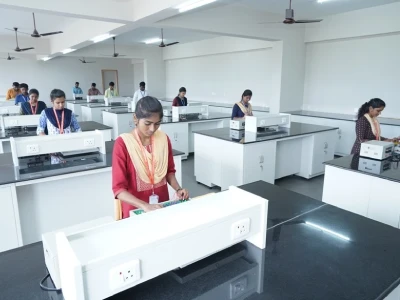
Advanced Academic Infrastructure
Access modern libraries, data labs, and research support centres equipped with the latest resources and tools to aid your doctoral studies.

Collaborative Learning
Interact with fellow researchers, scholars, and faculty members through interdisciplinary projects and academic forums.

Scholarly Community Engagement
Participate in academic clubs, journal discussions, and policy dialogues, fostering deeper insight and professional growth beyond the classroom.
Spread over 150 acres
At Takshashila University, you will have ample opportunities to hone your skills in real-world healthcare settings, utilising state-of-the-art medical facilities and simulation labs on our 150-acre campus.
Ready to take the next step in your academic and research journey?
Frequently Asked Questions (FAQs)
What is the duration of the Ph.D. in Economics?
The Ph.D. in Economics typically takes a minimum of 3 years to complete, with a maximum duration of 6 years, depending on the research progress and university guidelines.
Do I need to have a postgraduate degree in Economics to apply?
Yes, applicants should hold a Master’s degree in Economics or a related field from a recognised university with a minimum of 55% marks (or equivalent grade).
Is there any entrance exam or interview process?
Yes, admission to the Ph.D. programme is based on an entrance examination followed by a personal interview to assess research aptitude and subject knowledge.
What kind of research support will I receive during the programme?
Students receive guidance from experienced faculty, access to academic journals, data resources, and opportunities to present at conferences, publish papers, and collaborate on research projects

